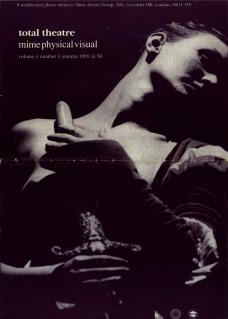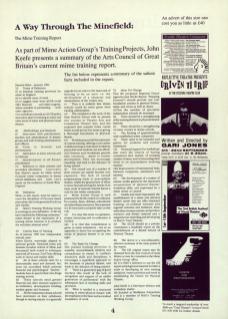1i) Terms of Reference
ii) to examine existing provision for mime in England
iii) to identify areas of need
iv) to suggest areas were ACGB could offer financial and other support, where possible in partnership with other agencies
v) to contribute towards an ACGB policy and action plan for training in mime and other areas of mime and physical/visual theatre
2i) Methodology and Research
ii) Interviews with practitioners, teachers and administrators of theatre groups and with funding administrators and officers
iii) Visits to festivals and performances
iv) Attendance at mime schools and workshops
v) Questionnaire to all known practitioners
vi) Reference to other primary and secondary information especially Bim Mason's report for Mime Action Group on mime component in drama school syllabuses, and John Lee's report on his residency in South West England.
3i) Definition
Mime, in this report, must be taken to cover the disciplines of Decroux-based pure mime; the work generated by Lecoq and Gaulier.
ii) MAG's Training Working Group is evolving its own definition – so far we have reached the following consensus: ‘mime theatre is the expression of a training whose function is to produce the articulate physical actor’.
4i) Current State of Training
As of January 1990 four independent schools exist. Adam Darius, seemingly aligned to personal growth. Desmond Jones and Animate (London School of Mime and Movement) both rooted in techniques and work of Decroux. Fool Time offering work in Circus and similar skills.
ii) All of these schools cater for a demonstrable need and demand, but none are accredited which presents financial and psychological barriers – students have to pay for their own fringe training activity.
iii) These schools need greater financial and other resource support ie accreditation, development funding, student grants and bursaries.
iv) All the mainstream drama schools have movement on their syllabuses, though to varying extents. It is generally regarded as an extra to the main task of learning to be an actor i.e. the development of a character and interpretation of the written text.
v) Thus it is unlikely that drama schools could do more given their training philosophies.
vi) The exception is the work of the Rose Bruford School with its present two courses in Theatre Arts and Community Theatre Arts, and the proposed new popular forms course which would devote five terms to giving a thorough foundation in physical theatre.
vii) Workshops provide the major part of current training, offering a rich variety of skills learning at individual workshop prices that most students can just afford.
viii) However, such workshops provide little continuity, depth or further development. They can encourage ‘snacking’ and lead to the delusion of being trained.
ix) The overall cost of a number of short courses can rapidly become very expensive. The lack of overall programming leads to unavoidable clashes, whilst the general lack of effort to move beyond serving the needs of an inner circle of minority interest leaves a void for the wider community.
x) Mime Action Group is well positioned to be the central co-ordinator for courses, dates, debates, educational and other library resources. But at present it is ill resourced to properly take on this role.
xi) It is clear that more co-operation, proper resourcing and co-ordination is needed.
xii) It is vital that consideration is given to mime animateurs – not as an appendix to dance but recognising the needs of physical theatre in its own right
6i) The Basis For Change
i) The present training provision is wasteful, uncoordinated, arbitrary and contradictory in nature. It conflates distinctive skills and disciplines; it encourages a superficial approach to the demands of physical theatre, and leads to the delusion of being trained.
ii) There is a generation gap of good teachers (the result of the lack of recognition and support of an earlier generation of performers) with the subsequent lack in teaching skills and provision.
iii) What is needed is a structured training in mime/physical theatre with the emphasis on the basic and accredited foundation of work.
7i) Ideas For Change
i) That the proposed Regional Dance Agencies (see Devlin Report; "Stepping Forward") should provide one-year foundation courses in physical theatre, mime and circus as well as dance.
ii) That the number of specialist independent schools be increased.
iii) There should be a strengthening of the training element in physical theatre festivals
iv) There should be a strengthening of mime courses in drama schools.
v) The forming of apprenticeships with established mime companies.
vi) There need to be bursaries and grants for students and trainee animateurs.
vii) Financial support for workshops that meet the criteria of having considered their market, of avoiding clashes of dates, and of structuring their work in an accumulative evolving manner.
viii) Improvement of international links between companies, animateurs and trainees.
ix) The development of a system of trainee credits gained by the structured accumulation of physical theatre/ workshop skills, and supervised by a mime centre or council.
x) Finally and most importantly the establishment of a mime and physical theatre centre that can offer extended training, co-ordinate national and regional activities and initiatives, liaise with other overseas centres, and produce resource and library material and a magazine (an extending and developing of MAG's Total Theatre).
xi) The ACGB should as a priority commission a feasibility report on the establishment of a British School of Physical Theatre.
8i) The above is a non-exhaustive, selective summary of the main points of the report.
ii) The full original report may be obtained from the Arts Council of Great Britain or may be consulted at the Mime Action Group office.
iii) It is MAG's intention to use the full report as background material for MAG's work in developing its own training initiatives, venue provision and work in establishing the Centre for Physical Theatre.
John Keefe is a freelance director and workshop trainer. He lectured at Middlesex Polytechnic and is a member of MAG's Training Working Group.

